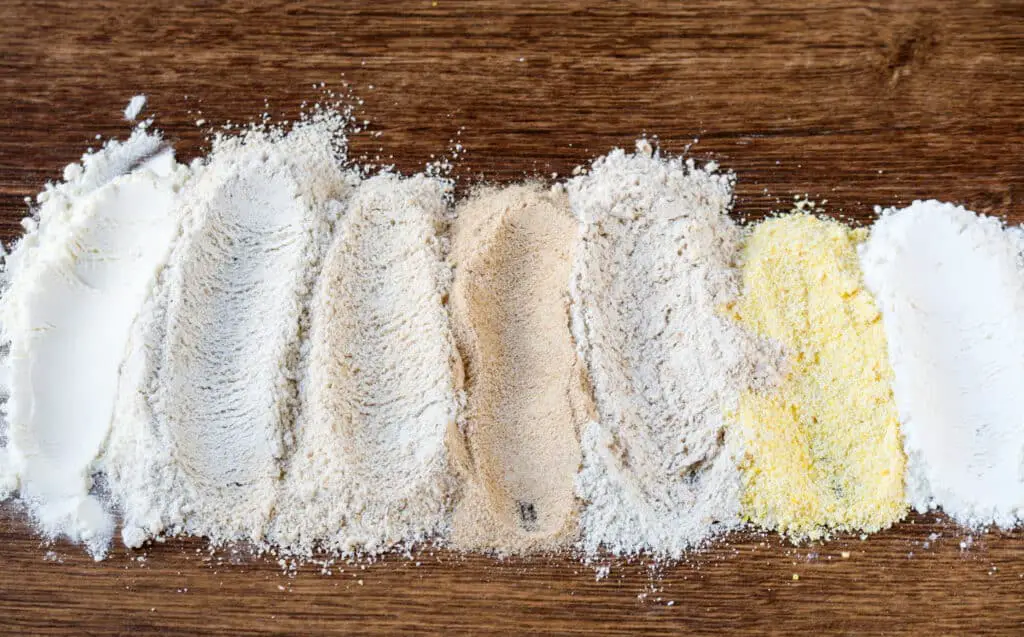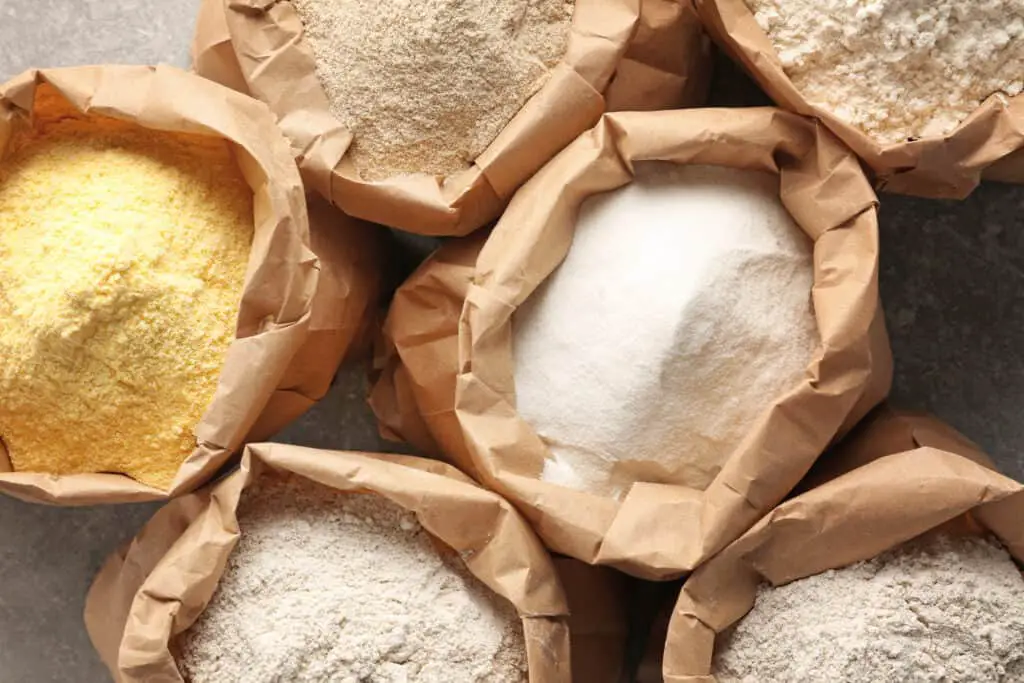Flour is a staple ingredient in many households, used to make everything from bread to pastries. However, not all flours are created equal when it comes to nutrition. In fact, some types of flour can actually be harmful to your health. So, what is the healthiest flour to use in your baking?
One option to consider is whole wheat flour. Unlike refined white flour, which has been stripped of its nutrients, whole wheat flour contains the entire wheat kernel and is rich in fiber, vitamins, and minerals. It has been linked to a lower risk of heart disease, type 2 diabetes, and certain types of cancer. While it may have a denser texture and stronger flavor than white flour, it can be used in a variety of baked goods, such as bread, muffins, and pancakes.

Understanding Flour Fundamentals
Endosperm
The endosperm is the largest part of the wheat kernel, making up about 83% of the kernel’s weight. It is the part of the kernel that is milled to produce flour. Endosperm is primarily made up of carbohydrates, including starch and protein.
Bran and Germ
The bran and germ are the smaller parts of the wheat kernel, making up about 17% of the kernel’s weight. The bran is the outer layer of the kernel and is rich in fiber, vitamins, and minerals. The germ is the embryo of the wheat kernel and is rich in healthy fats, vitamins, and minerals.
Whole Grain vs White Flour
Whole grain flour is made from the entire wheat kernel, including the bran, germ, and endosperm. This type of flour is higher in fiber, vitamins, and minerals than white flour. White flour, on the other hand, is made only from the endosperm and is lower in fiber, vitamins, and minerals.
Gluten and Gluten-Free
Gluten is a protein found in wheat, barley, and rye. It is what gives bread its chewy texture. Some people are intolerant to gluten and need to avoid it in their diet. Gluten-free flour is made from grains that do not contain gluten, such as rice, corn, and quinoa.
In summary, flour is made up of the endosperm, bran, and germ of the wheat kernel. Whole grain flour is higher in fiber, vitamins, and minerals than white flour. Gluten-free flour is made from grains that do not contain gluten.
Nutritional Composition of Flour
When it comes to choosing the healthiest flour, understanding its nutritional composition is crucial. Flour is a staple ingredient in many recipes, and its nutritional value can vary depending on the type of flour used. In this section, we will discuss the nutritional composition of flour, focusing on protein, fiber, vitamins, and minerals.
Protein
Protein is an important macronutrient that plays a crucial role in building and repairing tissues in the body. Flour is a good source of protein, with some varieties containing more protein than others. For example, whole wheat flour contains more protein than all-purpose flour. Here is a table comparing the protein content of different types of flour per 100 grams:
| Flour Type | Protein (g) |
|---|---|
| All-Purpose | 10.3 |
| Whole Wheat | 13.2 |
| Almond | 21.2 |
| Chickpea | 22.0 |
Fiber
Fiber is another important nutrient that is essential for good digestive health. Flour can be a good source of fiber, especially if you choose whole-grain or high-fiber varieties. Here is a table comparing the fiber content of different types of flour per 100 grams:
| Flour Type | Fiber (g) |
|---|---|
| All-Purpose | 0.6 |
| Whole Wheat | 12.2 |
| Coconut | 9.0 |
| Oat | 10.6 |
Vitamins and Minerals
Flour can also be a good source of vitamins and minerals, although the specific nutrients can vary depending on the type of flour used. Here are some of the key vitamins and minerals found in flour:
- Iron: Helps to transport oxygen throughout the body. Whole wheat flour is a good source of iron.
- Magnesium: Important for muscle and nerve function. Almond flour is a good source of magnesium.
- B Vitamins: Play a crucial role in energy production. Whole wheat flour is a good source of B vitamins.
- Vitamin E: An antioxidant that helps to protect cells from damage. Wheat germ is a good source of vitamin E.
Conclusion
In conclusion, the nutritional composition of flour can vary depending on the type of flour used. Whole wheat flour and high-fiber varieties tend to be the healthiest options, as they are rich in protein, fiber, and key vitamins and minerals. However, it is important to remember that flour should be consumed in moderation as part of a balanced diet.
Health Benefits of Different Flours
Whole Wheat Flour
Whole wheat flour is a nutritious flour that is made from whole wheat kernels. It is rich in fiber, iron, and B vitamins. Whole wheat flour can help regulate blood sugar levels and reduce the risk of heart disease. It is also a good source of antioxidants and can help improve digestive health.
Brown Rice Flour
Brown rice flour is a nutritious flour that is made from brown rice. It is gluten-free and a good source of fiber and protein. Brown rice flour can help regulate blood sugar levels, reduce the risk of heart disease, and improve digestive health. It is also rich in antioxidants and can help boost the immune system.
Almond Flour
Almond flour is a healthy flour alternative that is made from ground almonds. It is gluten-free and a good source of protein, healthy fats, and fiber. Almond flour can help regulate blood sugar levels, reduce the risk of heart disease, and improve digestive health. It is also rich in antioxidants and can help lower cholesterol levels.
Coconut Flour
Coconut flour is a nutritious flour that is made from dried coconut meat. It is gluten-free and a good source of fiber and healthy fats. Coconut flour can help regulate blood sugar levels, reduce the risk of heart disease, and improve digestive health. It is also rich in antioxidants and can help boost the immune system.
Buckwheat Flour
Buckwheat flour is a healthy flour alternative that is made from ground buckwheat. It is gluten-free and a good source of fiber and protein. Buckwheat flour can help regulate blood sugar levels, reduce the risk of heart disease, and improve digestive health. It is also rich in antioxidants and can help lower cholesterol levels.
Oat Flour
Oat flour is a nutritious flour that is made from ground oats. It is a good source of fiber and protein. Oat flour can help regulate blood sugar levels, reduce the risk of heart disease, and improve digestive health. It is also rich in antioxidants and can help lower cholesterol levels.
Quinoa Flour
Quinoa flour is a healthy flour alternative that is made from ground quinoa. It is gluten-free and a good source of protein, fiber, and iron. Quinoa flour can help regulate blood sugar levels, reduce the risk of heart disease, and improve digestive health. It is also rich in antioxidants and can help boost the immune system.
Cassava Flour
Cassava flour is a nutritious flour that is made from cassava root. It is gluten-free and a good source of fiber and carbohydrates. Cassava flour can help regulate blood sugar levels, improve digestive health, and boost energy levels. It is also rich in antioxidants and can help lower cholesterol levels.
Baking with Healthy Flours
When it comes to baking, using healthy flour options can be a great way to boost the nutritional value of your favorite baked goods. Here are some of the best healthy flours for baking and how to use them in your recipes.
Bread and Rolls
For bread and rolls, whole wheat flour is a great option. It’s rich in fiber and nutrients and has a nutty, slightly sweet flavor. You can also try using spelt flour, which is an ancient grain that’s high in protein and fiber.
Cakes and Muffins
When it comes to cakes and muffins, almond flour is a fantastic choice. It’s rich in healthy fats and protein, and it has a slightly sweet, nutty flavor. Coconut flour is another great option, as it’s high in fiber and low in carbohydrates.
Cookies and Biscuits
For cookies and biscuits, oat flour is a great choice. It’s high in fiber and has a slightly sweet flavor that pairs well with chocolate and other sweet ingredients. You can also try using buckwheat flour, which is high in protein and has a nutty, earthy flavor.
Pizza and Sourdough
When making pizza or sourdough bread, using whole grain flour is a great option. It’s high in fiber and nutrients, and it gives your pizza crust or sourdough bread a hearty, nutty flavor. You can also try using spelt flour for a lighter, nuttier flavor.
Overall, there are many healthy flour options available for baking. By incorporating these flours into your recipes, you can boost the nutritional value of your baked goods without sacrificing flavor or texture.

Special Dietary Considerations
Low Carb and Keto
For those following a low-carb or keto diet, almond flour and coconut flour are great options. Both flours are low in carbohydrates and high in healthy fats. Almond flour has a mild nutty flavor and can be used in a variety of baked goods, while coconut flour has a slightly sweet taste and works well in recipes that require a lot of moisture.
Paleo
If you follow a paleo diet, almond flour, coconut flour, and cassava flour are all good options. Almond and coconut flours are low in carbohydrates and high in healthy fats, while cassava flour is a good source of fiber and resistant starch. Cassava flour has a slightly sweet taste and can be used in a variety of recipes, including baked goods and savory dishes.
Gluten-Free and Celiac Disease
For those with gluten-free or celiac disease dietary restrictions, there are a variety of flours available. Almond flour, coconut flour, and cassava flour are all gluten-free and can be used in a variety of recipes. Additionally, there are many gluten-free all-purpose flour blends available that can be used as a substitute for wheat flour in most recipes.
Nut-Free
For those with nut allergies, cassava flour, and oat flour are good options. Cassava flour is a good source of fiber and resistant starch, while oat flour is high in protein and fiber. Both flours can be used in a variety of recipes, including baked goods and savory dishes.
It is important to note that while these flours may be suitable for certain dietary restrictions, it is still important to read ingredient labels and ensure that the flour has not been processed in a facility that also processes allergens or gluten-containing products.
Choosing the Right Flour
When it comes to choosing the right flour, there are several factors to consider. In this section, we’ll explore the texture and flavor, usage and versatility, and organic and non-GMO options to help you make an informed decision.
Texture and Flavor
Different flours have different textures and flavors that can affect the outcome of your baked goods. For example, all-purpose flour is a versatile option that can be used for a variety of recipes, but it has a neutral flavor and produces a moderate texture. On the other hand, almond flour has a nutty flavor and produces a denser texture, making it a great option for gluten-free baking.
Usage and Versatility
Consider how you plan to use the flour before making a purchase. Some flours, like bread flour, are specifically designed for yeast bread and will produce a chewier texture. Cake flour, on the other hand, is a low-protein flour that produces a tender crumb, making it ideal for delicate cakes and pastries. If you’re looking for a versatile option, all-purpose flour is a good choice.
Organic and Non-GMO
If you’re concerned about the environmental impact of your flour or the use of genetically modified organisms (GMOs), consider choosing organic and non-GMO options. These flours are made from grains that are grown without the use of synthetic pesticides or fertilizers and are not genetically modified. Look for certifications from organizations like the USDA or Non-GMO Project to ensure that your flour meets these standards.
In conclusion, choosing the right flour depends on your specific needs and preferences. Whether you’re looking for a specific texture or flavor, a versatile option, or an organic and non-GMO choice, there are plenty of options available. Consider your options carefully and experiment with different flours to find the perfect one for your baking needs.
Impact on Health
Weight and Diabetes
Choosing the right flour can have a significant impact on weight and diabetes management. Whole wheat flour is a better option than refined flour as it is rich in fiber, which helps in weight loss and maintaining blood sugar levels. Refined flour, on the other hand, has a high glycemic index, which can cause a sudden spike in blood sugar levels.
Heart Disease
The type of flour you use in your diet can affect your heart health. Whole wheat flour is rich in nutrients like fiber, antioxidants, and omega-3 fatty acids, which help in reducing the risk of heart disease. Refined flour, on the other hand, is low in nutrients and can increase the risk of heart disease.
Cholesterol and Blood Pressure
Choosing the right flour can also help in managing cholesterol and blood pressure levels. Whole wheat flour is rich in fiber, which helps in reducing bad cholesterol levels and maintaining blood pressure. Refined flour, on the other hand, is low in fiber and can increase bad cholesterol levels and blood pressure.
In summary, choosing the right flour can have a significant impact on your health. Whole wheat flour is a better option than refined flour as it is rich in nutrients and fiber, which helps in weight loss, maintaining blood sugar levels, reducing the risk of heart disease, and managing cholesterol and blood pressure levels.
Storing and Buying Healthy Flours
Pantry Staple
Healthy flours can be a great addition to any pantry. However, it is important to store them properly to ensure they maintain their freshness and nutritional value. Here are some tips for storing healthy flours:
- Keep flours in airtight containers to prevent moisture and pests from getting in.
- Store flours in a cool, dry place to prevent them from going rancid or spoiling.
- Label your flours with the date of purchase to keep track of their freshness.
Choosing the Right Brand
When it comes to buying healthy flours, there are a few things to keep in mind. Here are some tips for choosing the right brand:
- Look for brands that use high-quality, whole grain flours.
- Check the ingredient list to make sure there are no added preservatives or artificial ingredients.
- Choose organic flours when possible to avoid exposure to pesticides and other harmful chemicals.
Some popular brands of healthy flours include Bob’s Red Mill, King Arthur Flour, and Arrowhead Mills. It is important to do your own research and choose a brand that fits your specific dietary needs and preferences.
Remember, healthy flours can be a great addition to your diet, but it is important to store and buy them properly to ensure their freshness and nutritional value.
Frequently Asked Questions
What is the healthiest type of flour?
The healthiest type of flour depends on individual dietary needs and preferences. Whole grain flours, such as whole wheat flour, spelt flour, and rye flour, are generally considered healthier than refined flours because they contain more fiber, vitamins, and minerals. However, some people may prefer gluten-free flours, such as almond flour, coconut flour, or chickpea flour, for their specific dietary needs.
What is the healthiest flour for heart?
Whole grain flours, such as whole wheat flour, oat flour, and barley flour, are considered the healthiest flours for heart health because they contain high levels of fiber, which can help lower cholesterol levels and reduce the risk of heart disease.
Which healthy flour is closest to all-purpose flour?
White whole wheat flour is the healthiest flour that is closest in texture and flavor to all-purpose flour. It is made from hard white wheat, which has a milder flavor than traditional red wheat used in whole wheat flour.
Is oat flour healthy?
Oat flour is a healthy flour that is high in fiber and protein. It is also gluten-free, making it a good option for those with gluten sensitivities or celiac disease. Oat flour is also rich in antioxidants and can help lower cholesterol levels.
Is coconut flour healthy?
Coconut flour is a healthy flour that is high in fiber and low in carbohydrates. It is also gluten-free, making it a good option for those with gluten sensitivities or celiac disease. However, it is high in fat and calories, so it should be consumed in moderation.
What is the healthiest flour for diabetics?
Almond flour and coconut flour are considered the healthiest flours for diabetics because they are low in carbohydrates and have a low glycemic index, which means they do not cause a rapid increase in blood sugar levels. However, it is important to consume these flours in moderation as they are high in calories.
